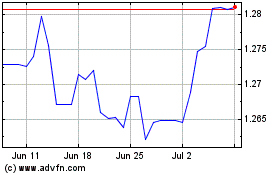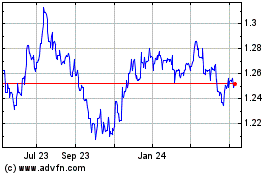German Business Confidence Highest Since June 2014
November 24 2015 - 3:42AM
RTTF2
German business confidence unexpectedly rose in November to its
highest level since the middle of last year, offering more evidence
that the biggest euro area economy continues to remain unscathed by
events such as the Volkswagen pollution cheating scandal and the
Paris terrorist attacks.
The business confidence index rose to 109 from 108.2 in October,
marking its best reading since June 2014's 109.4, the results of
the monthly survey by the Munich-based Ifo Institute showed
Tuesday. Economists had expected the index to hold steady after
easing in the previous month.
The German economy remains unaffected by growing uncertainty
worldwide, Ifo Institute President Hans-Werner Sinn said.
The current situation index of the survey climbed to 113.4 from
112.7. That was in contrast to economists' expectations for a third
straight monthly decline to 112.4.
Meanwhile, expectations improved for a third consecutive month
to the strongest level since May last year. The index rose to 104.7
from revised 103.9, well above economists' consensus of 104.
"The positive Ifo reading is a bit of a conundrum as it is not
entirely matched by positive hard data," ING Bank economist Carsten
Brzeski said.
Industrial production unexpectedly decreased for a second
straight month in September, signaling that the slowdown in
emerging markets, especially China, have began to hurt demand.
Factory orders declined for a third straight month, a trend last
seen in 2011.
The latest set of third quarter growth figures released by
Destatis earlier on Thursday confirmed that economic expansion
slowed as estimated on weak foreign trade and investment. Gross
domestic product advanced 0.3 percent from the previous three
months, when the economy expanded 0.4 percent.
"Unusually for Germany, consumers are driving growth," Capital
Economics economist Jennifer McKeown noted.
McKeown also pointed out that about 80 percent of responses of
the Ifo survey, which covers 7,000 firms, were taken before
November 13. Hence, most of any impact from the Paris attacks has
yet to come, she added.
"The continued health of the German economy might raise
questions about the need for more monetary policy support," McKeown
said. Given the weaker inflationary pressure across Eurozone,
including Germany, the economist expects the European Central Bank
to cut its deposit rate and announce extra asset purchases next
month.
On December 3, the ECB, headed by Mario Draghi, is widely
expected to raise the size of its monthly asset purchases to EUR 80
billion from EUR 60 billion and also extend the EUR 1.1 trillion
programme beyond its September 2016 deadline.
"While stronger-than-expected confidence indicators could
motivate some ECB members...argue against new ECB action, Draghi's
determination at the October meeting combined with continued
underlying economic weaknesses and the absence of any inflationary
pressure should be decisive in launching QE2," ING Bank's Brzeski
said.
Sterling vs US Dollar (FX:GBPUSD)
Forex Chart
From Aug 2024 to Sep 2024

Sterling vs US Dollar (FX:GBPUSD)
Forex Chart
From Sep 2023 to Sep 2024
